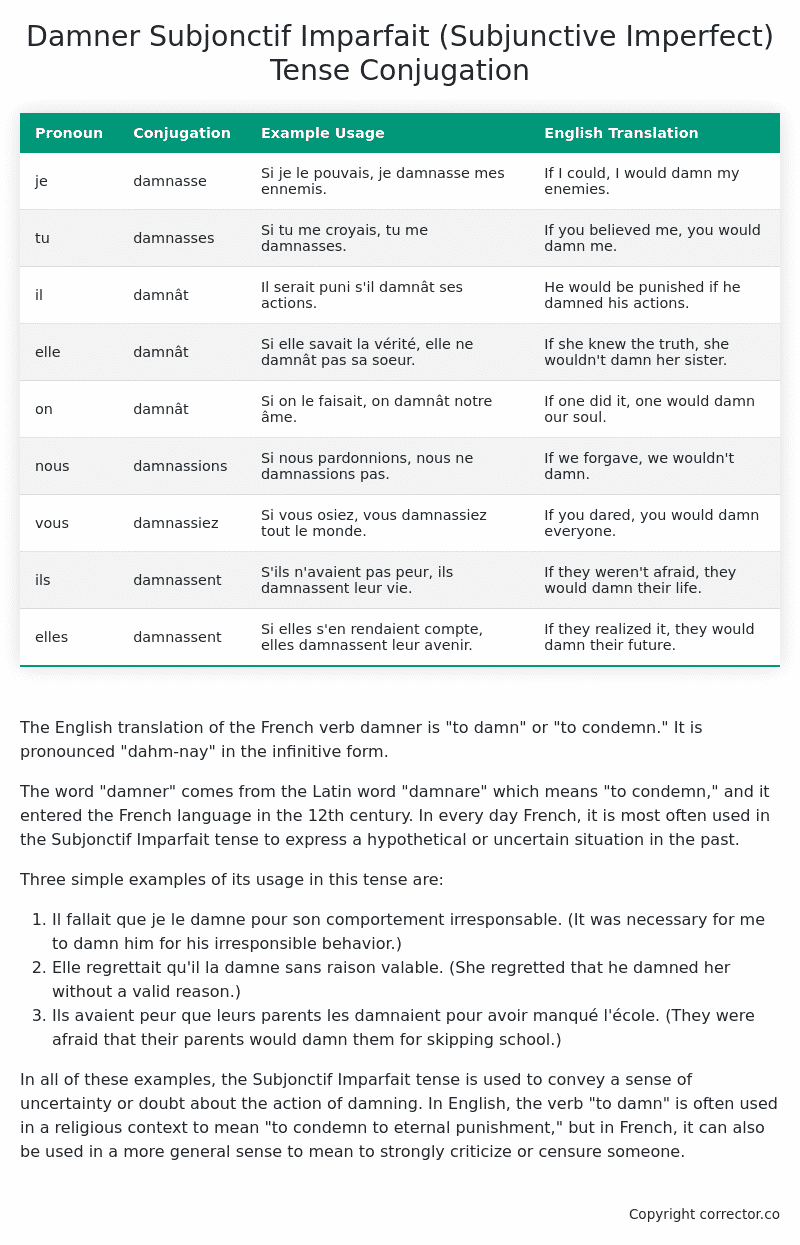Subjonctif Imparfait (Subjunctive Imperfect) Tense Conjugation of the French Verb damner
Introduction to the verb damner
The English translation of the French verb damner is “to damn” or “to condemn.” It is pronounced “dahm-nay” in the infinitive form.
The word “damner” comes from the Latin word “damnare” which means “to condemn,” and it entered the French language in the 12th century. In every day French, it is most often used in the Subjonctif Imparfait tense to express a hypothetical or uncertain situation in the past.
Three simple examples of its usage in this tense are:
- Il fallait que je le damne pour son comportement irresponsable. (It was necessary for me to damn him for his irresponsible behavior.)
- Elle regrettait qu’il la damne sans raison valable. (She regretted that he damned her without a valid reason.)
- Ils avaient peur que leurs parents les damnaient pour avoir manqué l’école. (They were afraid that their parents would damn them for skipping school.)
In all of these examples, the Subjonctif Imparfait tense is used to convey a sense of uncertainty or doubt about the action of damning. In English, the verb “to damn” is often used in a religious context to mean “to condemn to eternal punishment,” but in French, it can also be used in a more general sense to mean to strongly criticize or censure someone.
Table of the Subjonctif Imparfait (Subjunctive Imperfect) Tense Conjugation of damner
| Pronoun | Conjugation | Example Usage | English Translation |
|---|---|---|---|
| je | damnasse | Si je le pouvais, je damnasse mes ennemis. | If I could, I would damn my enemies. |
| tu | damnasses | Si tu me croyais, tu me damnasses. | If you believed me, you would damn me. |
| il | damnât | Il serait puni s’il damnât ses actions. | He would be punished if he damned his actions. |
| elle | damnât | Si elle savait la vérité, elle ne damnât pas sa soeur. | If she knew the truth, she wouldn’t damn her sister. |
| on | damnât | Si on le faisait, on damnât notre âme. | If one did it, one would damn our soul. |
| nous | damnassions | Si nous pardonnions, nous ne damnassions pas. | If we forgave, we wouldn’t damn. |
| vous | damnassiez | Si vous osiez, vous damnassiez tout le monde. | If you dared, you would damn everyone. |
| ils | damnassent | S’ils n’avaient pas peur, ils damnassent leur vie. | If they weren’t afraid, they would damn their life. |
| elles | damnassent | Si elles s’en rendaient compte, elles damnassent leur avenir. | If they realized it, they would damn their future. |
Other Conjugations for Damner.
Le Present (Present Tense) Conjugation of the French Verb damner
Imparfait (Imperfect) Tense Conjugation of the French Verb damner
Passé Simple (Simple Past) Tense Conjugation of the French Verb damner
Passé Composé (Present Perfect) Tense Conjugation of the French Verb damner
Futur Simple (Simple Future) Tense Conjugation of the French Verb damner
Futur Proche (Near Future) Tense Conjugation of the French Verb damner
Plus-que-parfait (Pluperfect) Tense Conjugation of the French Verb damner
Passé Antérieur (Past Anterior) Tense Conjugation of the French Verb damner
Futur Antérieur (Future Anterior) Tense Conjugation of the French Verb damner
Subjonctif Présent (Subjunctive Present) Tense Conjugation of the French Verb damner
Subjonctif Passé (Subjunctive Past) Tense Conjugation of the French Verb damner
Subjonctif Imparfait (Subjunctive Imperfect) Tense Conjugation of the French Verb damner (this article)
Subjonctif Plus-que-parfait (Subjunctive Pluperfect) Tense Conjugation of the French Verb damner
Conditionnel Présent (Conditional Present) Tense Conjugation of the French Verb damner
Conditionnel Passé (Conditional Past) Tense Conjugation of the French Verb damner
L’impératif Présent (Imperative Present) Tense Conjugation of the French Verb damner
L’infinitif Présent (Infinitive Present) Tense Conjugation of the French Verb damner
Struggling with French verbs or the language in general? Why not use our free French Grammar Checker – no registration required!
Get a FREE Download Study Sheet of this Conjugation 🔥
Simply right click the image below, click “save image” and get your free reference for the damner Subjonctif Imparfait tense conjugation!

Damner – About the French Subjonctif Imparfait (Subjunctive Imperfect) Tense
Formation
Common Everyday Usage Patterns
Interactions with Other Tenses
Subjonctif Présent
Indicatif Passé Composé
Conditional
Conditional Perfect
Summary
I hope you enjoyed this article on the verb damner. Still in a learning mood? Check out another TOTALLY random French verb conjugation!


